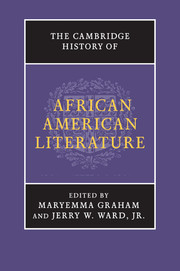Book contents
- Frontmatter
- Introduction
- PART I AFRICAN AMERICAN LITERATURE FROM ITS ORIGINS TO THE TWENTIETH CENTURY
- PART II AFRICAN AMERICAN LITERATURE IN THE TWENTIETH CENTURY
- 12 Foundations of African American modernism, 1910–1950
- 13 The New Negro Movement and the politics of art
- 14 African American literature and the Great Depression
- 15 Weaving jagged words: the black Left, 1930s–1940s
- 16 Writing the American story, 1945–1952
- 17 Geographies of the modern: writing beyond borders and boundaries
- 18 African American literature by writers of Caribbean descent
- 19 Reform and revolution, 1965–1976: the Black Aesthetic at work
- 20 History as fact and fiction
- 21 Redefining the art of poetry
- 22 Cultural resistance and avant-garde aesthetics: African American poetry from 1970 to the present
- 23 New frontiers, cross-currents and convergences: emerging cultural paradigms
- PART III AFRICAN AMERICAN LITERATURE AS ACADEMIC AND CULTURAL CAPITAL
- Bibliography
- Index
- References
19 - Reform and revolution, 1965–1976: the Black Aesthetic at work
from PART II - AFRICAN AMERICAN LITERATURE IN THE TWENTIETH CENTURY
Published online by Cambridge University Press: 28 May 2011
- Frontmatter
- Introduction
- PART I AFRICAN AMERICAN LITERATURE FROM ITS ORIGINS TO THE TWENTIETH CENTURY
- PART II AFRICAN AMERICAN LITERATURE IN THE TWENTIETH CENTURY
- 12 Foundations of African American modernism, 1910–1950
- 13 The New Negro Movement and the politics of art
- 14 African American literature and the Great Depression
- 15 Weaving jagged words: the black Left, 1930s–1940s
- 16 Writing the American story, 1945–1952
- 17 Geographies of the modern: writing beyond borders and boundaries
- 18 African American literature by writers of Caribbean descent
- 19 Reform and revolution, 1965–1976: the Black Aesthetic at work
- 20 History as fact and fiction
- 21 Redefining the art of poetry
- 22 Cultural resistance and avant-garde aesthetics: African American poetry from 1970 to the present
- 23 New frontiers, cross-currents and convergences: emerging cultural paradigms
- PART III AFRICAN AMERICAN LITERATURE AS ACADEMIC AND CULTURAL CAPITAL
- Bibliography
- Index
- References
Summary
During the late 1960s and early 1970s, black poets, literary critics, and theorists achieved an exceptional level of national visibility. Together, they produced a body of texts that exuded the spirit of Black Power self-determination and amplified the vibrant, versatile rhythms of African American expressive culture. Two books, Black Fire: An Anthology of Afro-American Writing (1968) edited by LeRoi Jones (Amiri Baraka) and Larry Neal (1937–81) and The Black Aesthetic (1971) edited by Addison Gayle (1932–91), exemplify the confluence of creative artists and intellectuals who committed themselves to generating a culturally distinct body of artistic productions for the benefit of black audiences. More broadly, considerations of the context in which Black Fire and The Black Aesthetic emerged confirm the degrees to which a militant, nationalist ethos, the development of a black-based evaluative system of arts, and the convergence of a variety of African American writers in common publishing outlets characterized the Black Arts era. On the one hand, poets, playwrights, fiction writers, and essayists composed works that celebrated African American culture, critiqued anti-black racism, and promoted black liberation. At the same time, anthologists, magazine editors, and publishers created or sustained venues for the wide transmission of black literary art.
- Type
- Chapter
- Information
- The Cambridge History of African American Literature , pp. 405 - 450Publisher: Cambridge University PressPrint publication year: 2011



